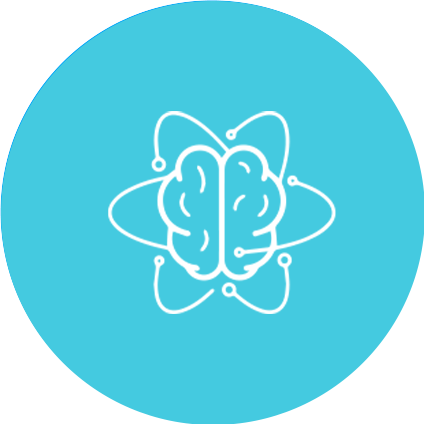Human
Resources
Like many other countries, Brazil faces high prevalence rates of mental disorders in children and adolescents. Nonetheless, we are met with a shortage of qualified child mental health professionals, who are up-to-date with the latest advances in developmental translational neuroscience and able to apply them in their daily practice. According to a study conducted by our researchers at the institute, only 20% of children with mental disorders have access to specialized care.
In addition to our research, which is based on data from more than 2,500 children and adolescents tracked for over a decade, we are committed to addressing knowledge gaps in the field of mental health. We strive to promote innovative ideas in digital mental health, foster entrepreneurship, and support the transfer of technology to society. As a result, our research, which has already been validated and proven effective, is implemented in real-world settings, having a direct and positive impact on the lives of individuals.
To continue contributing and advancing in this field, we offer high-quality training programs in a range of academic formats. We take it as our duty to empower professionals and disseminate the knowledge needed to improve child mental health in our country.
Source: Use of mental health services by children with mental disorders in two major cities in Brazil – Psychiatry Online

Undergraduate Research

Graduate Program

Tripartite
Undergraduate Research
The Iniciação Científica Program (PIC), an undergraduate introductory research program at CISM, is an educational initiative intended for students pursuing degrees in health-related fields (medicine, psychology, nursing, physiotherapy, nutrition, and biomedicine) from the following universities: University of São Paulo (USP), Federal University of São Paulo (Unifesp), Jaguariúna University Center (UniFaj), and Centro Universitário Max Planck (UniMax), as well as other invited universities.
Read more
PIC’s goal is to provide students with the opportunity to engage in academic research activities under the guidance of more experienced professors or researchers. Through this program, students gain hands-on experience in conducting research, helping them understand the scientific investigation process and develop essential skills in the field.
PIC requires a minimum dedication of five hours per week, at times outside the student’s regular academic schedule. Activities include conducting research tasks, attending regular meetings with supervisors, presenting findings, and occasionally publishing scientific articles.
The selection process for PIC positions is managed by the CISM board, which evaluates candidates based on their previous engagement in academic and outreach activities, as well as their motivation, as outlined in a letter of intent.
By the end of the process, students must present a structured research project under the supervision of a CISM faculty advisor, which will be evaluated by a committee appointed by the CISM board. Successful candidates may be awarded a scholarship from a funding agency.
Undergraduate research can serve as a stepping stone in the academic and professional development of students pursuing careers in science, research, and education.
Coordinator: Dr. Rodolfo Furlan Damiano – damianorf@gmail.com
Undergraduate Research
PIC’s goal is to provide students with the opportunity to engage in academic research activities under the guidance of more experienced professors or researchers. Through this program, students gain hands-on experience in conducting research, helping them understand the scientific investigation process and develop essential skills in the field.
PIC requires a minimum dedication of five hours per week, at times outside the student’s regular academic schedule. Activities include conducting research tasks, attending regular meetings with supervisors, presenting findings, and occasionally publishing scientific articles.
The selection process for PIC positions is managed by the CISM board, which evaluates candidates based on their previous engagement in academic and outreach activities, as well as their motivation, as outlined in a letter of intent.
By the end of the process, students must present a structured research project under the supervision of a CISM faculty advisor, which will be evaluated by a committee appointed by the CISM board. Successful candidates may be awarded a scholarship from a funding agency.
Undergraduate research can serve as a stepping stone in the academic and professional development of students pursuing careers in science, research, and education.
Coordinator: Dr. Rodolfo Furlan Damiano – damianorf@gmail.com
Graduate Program
The INPD graduate program offers researchers the opportunity to engage with leading experts in Brazil and around the world on topics relevant to developmental psychiatry. Students gain access to highly relevant data on epidemiology, neuroimaging, genetics, clinical psychiatry, and psychopathology, enabling them to develop academic and professional careers and become leaders in their respective fields.
Graduate Program
The INPD graduate program offers researchers the opportunity to engage with leading experts in Brazil and around the world on topics relevant to developmental psychiatry. Students gain access to highly relevant data on epidemiology, neuroimaging, genetics, clinical psychiatry, and psychopathology, enabling them to develop academic and professional careers and become leaders in their respective fields.
Tripartite
The special international Tripartite graduate program in developmental translational neuroscience aims to attract Brazilian and international students interested in pursuing studies in developmental psychiatry through the three leading graduate programs in psychiatry in Brazil (the Department of Psychiatry at Unifesp, the Institute of Psychiatry at USP, and the Department of Psychiatry at the Federal University of Rio Grande do Sul – UFRGS). The program trains top-tier researchers in psychiatry, neuroscience and mental health, with an emphasis on early developmental stages.
Read more
In the Tripartite program, we combine the strengths of each of these three graduate programs to prepare researchers with in-depth knowledge in advanced, world-class methodologies, such as epidemiology, clinical psychiatry, clinical neuroscience, integrative neuroscience, and mental disorder prevention. It offers courses in English taught by internationally recognized professors with significant impact in the field. In addition, young researchers have the opportunity to participate in ongoing high-level studies led by program faculty advisors. We expect to train future academic leaders capable of addressing the enormous complexity of this research area.
To apply for the program, you must:
1. Have at least one A1 article or two A2 articles as the first author, either published or in the process of acceptance for publication;
2. Submit a motivation letter in English demonstrating your commitment to research and engagement in an academic career;
3. Be enrolled in the graduate program at one of the participating institutions.Admissions are open year-round. Please contact your program office or email:programatripartite@gmail.com
Tripartite
In the Tripartite program, we combine the strengths of each of these three graduate programs to prepare researchers with in-depth knowledge in advanced, world-class methodologies, such as epidemiology, clinical psychiatry, clinical neuroscience, integrative neuroscience, and mental disorder prevention. It offers courses in English taught by internationally recognized professors with significant impact in the field. In addition, young researchers have the opportunity to participate in ongoing high-level studies led by program faculty advisors. We expect to train future academic leaders capable of addressing the enormous complexity of this research area.
To apply for the program, you must:
1. Have at least one A1 article or two A2 articles as the first author, either published or in the process of acceptance for publication;
2. Submit a motivation letter in English demonstrating your commitment to research and engagement in an academic career;
3. Be enrolled in the graduate program at one of the participating institutions.
Admissions are open year-round. Please contact your program office or email:programatripartite@gmail.com
Nucleação
Esta atividade apoia grupos emergentes dos mais diferentes estados brasileiros, na formação de profissionais de excelência e desenvolvimento de pesquisas em psiquiatria do desenvolvimento. Além disso, também incentivamos a formação de novos grupos de pós-graduação em psiquiatria, a fim de promover a melhor prática psiquiátrica baseada em evidências e valores.
A fim de impactarmos positivamente na sociedade, incentivamos que os nossos professores e estudantes se comprometam a retornar aos seus locais de origem e iniciarem o processo de desenvolvimento de programas de pós-graduação com atuação local, reproduzindo formação de recursos humanos para a docência e pesquisa, com foco na psiquiatria do desenvolvimento.
Listagem de Alunos
Nome: Marina de Menezes Corradi
Instituição: UNIMAXNome: Rodrigo Hadade
Instituição: UNIMAXNome: Júlia de Fátima Navarro Pedro
Instituição: UNIMAXNome: Beatriz Latri Brunetti Peres
Instituição: UNIMAXNome: Késsien Regina Sander Oliva
Instituição: UNIMAXNome: Gian Carlo Araujo do Amaral
Instituição: UNIMAXNome: Vanilda Ramos Alexandre Serrano Guimarães
Instituição: UNIMAXNome: Felipe Peres Albertoni
Instituição: UNIMAXNome: Bruna Marques Silva
Instituição: UNIMAXNome: Jônatas Magalhães Santos
Instituição: USPNome: João Vítor Ribeiro Oliveira
Instituição: USPNome: Amanda Goulart Coli
Instituição: USPNome: Julia Vallin Rodrigues Alves
Instituição: USCNome: Maria Julia Guimaraes Caruso
Instituição: USCNome: Alissom Vitti Cincoto
Instituição: USPNome: Lara Bonanni Mota
Instituição: USPNome: Yasmin costa de melo
Instituição: UnicampNome: Danielle de Jesus Matozinhos
Instituição: UnicampNome: Victor Augusto de Oliveira Fogaça
Instituição: UnicampNome: Jennifer Vieira
Instituição: UnicampNome: Elisa Micaela Costa Ferreira
Instituição: USPNome: Matheus Andrade Neves
Instituição: USP


